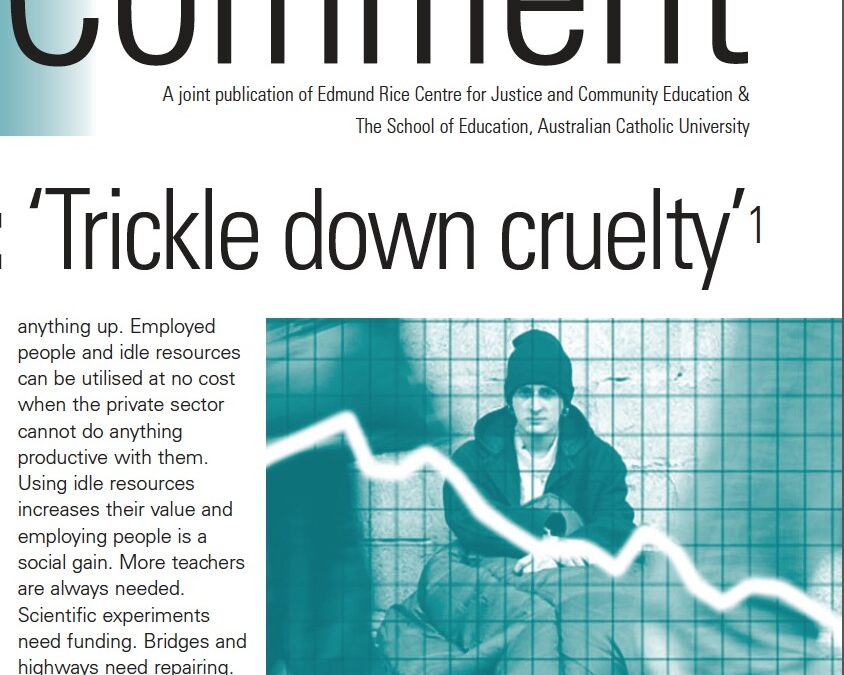 The Edmund Rice Center of the Australian Catholic University writes in a piece that looks at the austerity discussions taking place in so many countries in the world…
The Edmund Rice Center of the Australian Catholic University writes in a piece that looks at the austerity discussions taking place in so many countries in the world…
“As several countries try to pay off huge public debt due to the financial crisis and apply spending cuts – voices of caution say this is ‘a dangerous idea’ because this response indicates there is one set of rules for rich countries and another for poor countries.2 The financial ship has been taken into dangerous waters by those at the top and they do not suffer from austerity budgets. We need to listen to those who have suffered from these budgets: children who only get one chance at an education; the sick and disabled unable to support themselves; and seniors too old to work.3 This war on the majority of people intensifies as the global business class’ call for austerity ‘hides processes of the uneven distribution of risk and vulnerability.’4 Belt-tightening cannot work. Austerity budgets result in falling incomes which result in less spending. Governments need to borrow to enable more public sector spending.5
Belt tightening will not work.
Standard wisdom
Western governments, always seeing the glass half empty, are implementing recession policies where they cannot trade out of their difficulties. Jobs and growth cannot be achieved through continued austerity. The idea of ‘austerity’ has emerged from a so-called economic ‘orthodoxy’ that by focusing on state spending sees the solution tothe crisis in belt tightening, cuts in social spending and higher taxes. The idea of ‘living within our means’ persists as a solution. It is ‘a dangerous idea’ because often it does not work. Governments are not like households or companies. They have a ‘free lunch’ option: they can spend without giving anything up. Employed people and idle resources can be utilised at no cost when the private sector cannot do anything productive with them.
Using idle resources increases their value and employing people is a social gain.
- More teachers are always needed.
- Scientific experiments need funding.
- Bridges and highways need repairing. Infrastructure for newenergy sources is required.
During recession, consumption is relatively cheap because idle resources are appropriately used – rather than those used for destructive and unproductive wars6, or building more prisons.
Demands for ‘austerity’ and ‘balanced budgets’ are cruel, unjust, and selfdefeating. We need to reverse policies that have allow the top 1% to seize anoverwhelming share of economic growth. Calls for cuts to government debts ignore the fact that many are dueto bank bailouts. Supporters of
austerity often fail to challenge inefficient corporate welfare and tax subsidies for the idle rich, or wars of choice and ideologically driven prisons that prove toughness, yet complain about social and medical welfare.
Reforms need to exclude the welfare seeking wealthy, and companies need support to provide secure employment, fair wages, produce reasonably priced goods and services rather than provide ‘instant wealth’ for a wealthy minority. Investment rather than belt tightening should be the route to greater justice and greater affluence.
Who is hurting?
Political leaders must overcome the obsession with eliminating deficits. They must use temporary deficits to restart growth. The European Union has misread history. And ignored the teachings of John Maynard Keynes who argued for economy expansion through spending and tax cuts during recessions rather than the opposite. Lessons from history have been brushed aside for ideological reasons. The warnings of many experts about too drastic an austerity programme seem well founded. They make severe cuts in government spending hard to justify7.
Budget cuts or tax increases reduce demand for good and services when they are most needed. By ignoring this, policy makers will deepen, not solve, the financial crisis and millions will suffer needlessly. The working and middle classes have been subjected to a new tyranny: ‘in which there can be only one kind of value, market value; one kind of success, profit; one kind of existence, commodities; and one kind of social relationship, markets.’ The demand for austerity hides processes of the uneven distribution of risk and vulnerability8.
Austerity rewards the wealthy and imposes poverty, suffering and severe hardship on people marginalised by race, disability and class. The call for a harsh politics of austerity in the USA have been hypocritical and disingenuous: hypocritical for their support for massive tax breaks for the rich; and disingenuous because the implementation of a market-based agenda imposes the burden of decreased government services and benefits on the backs of the poor, young people, the unemployed, the working class and middle-class individuals and families.
Austerity measures apply to the poor, not the rich, who still do well under polices that produce government bailouts, support deficit-producing wars, tax breaks for the wealthy and deregulation policies that benefit powerful corporations. Calls for shared sacrifices in the name of balancing budgets do not promote justice, equality and the public good.
They maximize self-interest, support a culture of organised irresponsibility, and expand the pathologies of inequality, military spending and poverty9.
Such policies proliferate a culture of cruelty. They are harsh and brutalising for young people, the unemployed, the elderly, the poor, and other individuals and groups that bear the burden of economic recession.
The institutions of capital, wealth and power merge not only to generate vast modes of inequality, but also to inflict immense amounts of pain and suffering upon the lives of the poor, working people, the middle class, the elderly, immigrants and young people10.
The politics of austerity is not about rethinking priorities to benefit the public good or work towards a better world but is a war on the poor rather than poverty; on young people rather than those economic and political forces that undermine their future; and, on those considered ‘other’ rather than on the underlying structures and ideologies of various forms of state and individual racism11.
Effects
The welfare state is ceding to the harsh realities of the punishing state.
Social problems are increasingly criminalised; social protections are either eliminated or weakened; increased incarceration of young people where the prison-industrial complex is particularly lethal for poor youth of colour and adults; public schools being modeled on prisons; harsh anti-immigration laws; and policies that bail out financial institutions. The middle and working classes are left in a state of poverty, despair and insecurity12.
Government support for the poor, unemployed, sick and elderly are derided because they either contribute to an increase in the growing deficit or they undermine the market-driven notion of individual responsibility. Those same critics defend government support for the ultra-wealthy, the bankers, the permanent war economy, or subsidies for corporations as essential to the life of the nation. As public services are eliminated, health insurance cut,teachers and public workers are laid off, corporate profits soar and executivegives themselves bonuses13.
The moral obscenity characterising such salaries becomes clear when 14 million people are looking for work, millions are losing their homes and thousands of families are trying to survive on food stamps14.
As the language of privatisation, deregulation and commodification replaces the discourse of the public good, all things public (e.g., public schools, libraries and public services) are viewed either as a drain on the market or as a pathology. In addition, inequality in wealth and income expands, spreading like a toxin through everyday life, poisoning democracy and relegating more and more individuals to a growing army of disposable human waste15.
A market-driven society is not synonymous with democracy. The privileges of the rich and the corporate elite do more to crush democracy than uplift society. A society that allows the market to constitute the axis and framing mechanisms for all social interactions has not only lost its sense of morality and responsibility but ceded its claim on any vestige of a democratic future. It is market fundamentalism and its structure of extreme inequality and machinery of cruelty that proves to a death sentence on democracy16.
Can austerity lead to revolution? famine? anarchy? or, civil war?
Conclusion
The savage effects of the European Union’s policies on Greek society today should be questioned. Can austerity lead to revolution? famine? anarchy? or, civil war? Greece today is at the epicentre of an horrific assault on working people, the marginalised and on its democracy. At least they have stood up and protested17.
But, capital rules. The interests of corporations and financial institutions take precedence over those of people and governments are limited to rubber stamping the predatory actions of cut-throat speculators whose only interest is fattening the bottom line for their shareholders.18
The rising tide of suffering cannot be dealt with by shifting the burden downward. Civil unrest is the last recourse and natural consequence of austerity – and the only way to deal with this is with brutal crowd control by mobilizing security forced to ‘protect gated communities’ and contain violence in poor areas.19
Full set of resources and references are on the ERC website www.erg.org.au
Download full content below
Name  |
Size  |
Uploaded  |
Actions |
| ERC_JustComment_15.2_Austerity.pdf | 114.85 KB | 04/17/2012 | Download |
| ERC_JustComment_15.2_Austerity_referenced.pdf | 304.26 KB | 04/16/2012 | Download |
Tags: Advocacy, Poverty Analysis


